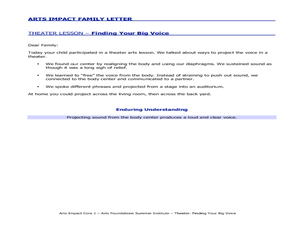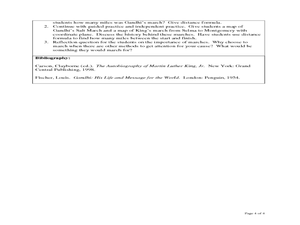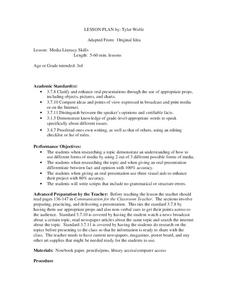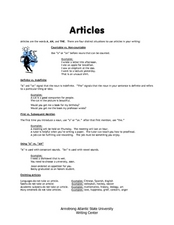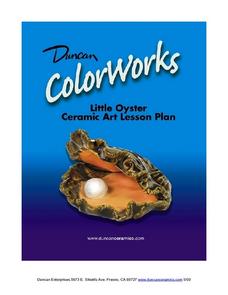Curated OER
The Science of Respiration and Blood Circulation
Fifth graders study how respiration and circulation are connected. In this respiratory lesson students complete several activities to better understand heart rate and carbon dioxide in the body.
Curated OER
Patterns in Dance and Math
Students analyze how repeated body movements and shapes can represent and extend patterns. In this pattern analysis lesson, students discuss patterns in dance, math, and everyday living. Students demonstrate a dance using a sequence of...
Curated OER
Finding Your Big Voice
Students use their diaphragm to create vocal vibrations, vocal sounds, and project sounds through an open space. For this sounds lesson plan, students learn how to use their voices to project through an auditorium.
Curated OER
Arts Impact and Math
Third graders incorporate math into dancing. In this algebra lesson, 3rd graders identify different shapes and patterns using dance movements. They relate the different creations to polygons as they incorporate the use of stretchy bands...
Curated OER
The Distance Formula and Marching Nonviolently for Social Change
Students explore the distance formula using real world data from nonviolent marches for social change. In this secondary mathematics lesson, students investigate the marches of Gandhi and King using maps overlaid with a coordinate...
Curated OER
Media Literacy Skills
You're on camera! Third graders find a news story and research it to get more information. Everyone uses their found information to write a script and create their own news broadcast!
Curated OER
Articles and Article Check-Up
Help your learners practice proper article usage with this informational handout and brief exercise. After reading information about articles and their uses, including details about when to omit articles, scholars complete fourteen...
Curated OER
Active and Passive Voice: Finding Examples Online
Incorporate technological fluency with a search for examples of active and passive voice in online resources. Discuss how use of active or passive voice influences mood or tone and contributes to author's purpose. List of...
Curated OER
Walk Two Moons: DR-TA, Chapter 17: “In the Course of a Lifetime”
Use this question and answer worksheet as an assignment for Sharon Creech's Walk Two Moons. The questions listed support better comprehension and critical thinking of chapter seventeen.
Curated OER
Renaissance and Reformation Chapter Test
This is a traditional textbook chapter test on the Renaissance and Reformation, complete with eight multiple choice questions, six fill-in-the-blank, and a 10-question matching section identifying key individuals and terms from the...
AGTV
Ein Interkulturelles Projekt!
Get your class in touch with other students of German (or German students) through this intercultural project. Your pupils can correspond with others in any or all of the ways listed here. The resource provides links to special programs...
Curated OER
A GREAT SPORT
Students explore how diverse groups and individuals have contributed to the cultural development of Canada, and then produce two-dimensional works of art.
Curated OER
Hand Vase: Ceramics
Ceramics can be a wonderful medium. The class creates fun and funky hand shapes vases inspired by Aboriginal art forms. This would be a great project to do just before Mother's Day.
Curated OER
Native Design Coil Vase: Ceramics Lesson
After a quick study of Native American art, symbolism, and pattern design children make a ceramic vase. They read about the use, production, and design of Native American vases or pots, then use clay to create one of their own. Tip:...
Curated OER
Little Oyster: Ceramic Lesson
Children will love researching and then creating a bottom dwelling mollusk of their own. They watch clips describing the ocean ecosystem and how oysters fit into their environment. Next, they research what oysters eat and how they look....
Curated OER
Empty Oceans
In groups of four, pupils brainstorm about seafood. They view the Monterey Bay Aquarium Seafood Watch website to examine the problems caused by the seafood industry. Learners are then brought back together to discuss what they...
Curated OER
Where in the world is the Hydra Electron?
Walk your class through the journey water takes once it leaves your kitchen sink, all the way through the water cycle. Demonstrations support your lecture. This plan is thoroughly written, but ideally you would follow it up with water...
Curated OER
Using Harmonic Vision’s Music Ace Software to Reinforce Basic Music Skills
If you have access to Harmonic Vision’s Music Ace Software, then this instructional activity could work for you. Kindergarteners use the video music software to place, identify, and read musical notes. They listen in and identify both...
Curated OER
Baseball Anyone
Students explore the change in values from the 1920's to the present. In groups, students use the internet to analyze Pete Rose and gambling in sports. The 1919 scandal of the World Series is explored and discussed by students. They...
Curated OER
HOW ABOUT A T-BONE?
Learners investigate the events that created the historical context for the Progressive Era in the United States. They evaluate the conflicts of business and common people of the time. The research is done using primary and secondary...
Curated OER
Graphing Ordered Pairs On A Coordinate Plane
Sinking ships, construction paper, coordinate planes, sounds like fun day in math class. Play the game Battleship with your class and reinforce the concept of graphing ordered pairs.
Curated OER
Volume of a Cylinder
Middle and high schoolers calculate the volume of cylinders. They measure the height, radius and diameter of cylinders. Following given formulas, learners calculate the area and volume of the cylinder. They compare cylinders and predict...
Curated OER
Factoring Polynomials
Young mathematicians examine the "Tic-tac-toe" factoring method to factor polynomials. They use algebra tiles to model solutions of binomial multiplication problems. They discuss strategies and observe teacher-made models for solving...
Curated OER
Ordering Integers
Sixth and seventh graders compare and order integers. After locating integers in a newspaper, they describe examples of negative and positive integers. They draw a thermometer and locate positive and negative integers on the scale. In...




